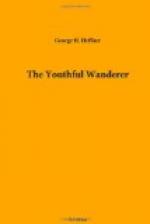and chimes the quarters, on the face of which the
whole of the twenty-four hours (twelve day and twelve
night) are shown and regulated; within this circle
the sun is seen in his course, with the time of rising
and setting by an Horison receding or advancing as
the days lengthen and shorten, and under is seen the
moon showing her different quarters, phases, age,
&c. 8th—Two female figures, one on each
side of the Dial Plate, representing Fame and Terpsichore,
who move in time when the organ plays. 9th—A
Movement regulating the Clock as a repeater to strike
or be silent. 10th—Saturn, the God of Time,
who beats in movement while the organ plays. 11th—A
circle of the face shows the names of eight celebrated
tunes played by the organ in the interior of the cabinet
every four hours. 12th—A Belfry with six
ringers, who ring a merry peal
ad libitum;
the interior of this part of the cabinet is ornamented
with beautiful paintings, representing some of the
principal ancient Buildings of the city of Exeter.
13th—Connected with the organ there is a
Bird Organ, which plays when required. This unrivaled
piece of mechanism was perfectly cleaned and repaired
by
W. Frost, of Exeter, a self-taught
artist. Jacob Lovelace, the maker, ended his days
in great poverty in Exeter, at the age of sixty years,
having been thirty-four years in completing it.
This museum also contains glass of the Roman period—A.D.
100-500. The best specimens are a little greenish,
but quite clear. One of the Egyptian mummies
is wrapped up by a bandage of cloth, that was woven
3,000 years ago. It is still in a good state of
preservation.
Tuesday, July 6th. The Sultan of Zanzibar, who
was on a tour of inspection, started from the North-western
Hotel at about 10:00 o’clock to drive out to
the docks. He was accompanied by two natives from
his own country, and the mayor and thirteen British
cavaliers. The appearance, in Liverpool, of this
South African dignitary, created a considerable sensation.
Chapter III.
Chester.
At 10:45 I left Liverpool for Chester. Edge Hill
Tunnel, which is about a mile or a mile and a quarter
in length, was passed in five minutes. Grain
ripens from one to two months later here, than in Pennsylvania.
The farmers were busy making hay, and the wheat still
retained a dark green color. Harvesting is done
in August and September. Wheat, rye, barley and
potatoes are the staple products. No corn is cultivated
in northern England. Wood is so scarce and dear
in Great Britain, as well as upon the continent, that
the farmers can not afford to build rail-fences.
Hedge-fences, walls and ditches, therefore, take their
places in every European country. All this is
new to the American when he first comes to the Old
World. Pass some fields of clover still in bloom.
See men mow with the same “German” scythes
that we use in America. We reached Chester before




